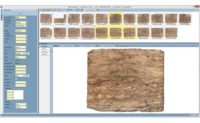Founded in July 1993, the Tennessee Marble Company is a family business that owns and operates four quarries in Tennessee, as well as the seasonally operated Champlain Black quarry in Isle LaMotte, VT. Owned by Monica Gawet, the company is the only active quarrier of Tennessee marble in the U.S. The stone itself has a long-standing history, and Tennessee Marble Company, which currently has 30 employees -- with eight at its Tennessee sites, two in Vermont and a staff of 15 at its production plant, continues to supply the material to projects nationwide.
Some notable American structures that the company has supplied material for in recent years include the new stairways at the East Wing of the National Gallery of Art in Washington, DC, where it had to match existing Fleuri cut medium to dark pink from its Endsley quarry. “A total of 5,000 square feet comprising of rake cut stairs and risers, matched to mirror existing flooring on the main level,” explained Gawet. “We also supplied triangle pavers to match the existing flooring that’s 60 years old.” Additional projects include solid cubic exterior corner pieces for a roof terrace renovation, as well as 10,000 square feet of large-format paving for the Department of State Visitor Center and National Museum of American Diplomacy building in Washington, DC. Currently, Tennessee Marble Company is supplying veneer dimensional stone to the new Tennessee State Museum in Nashville, TN.
The company primarily focuses on cut-to-size pieces, but it also sells slabs and tile. “We fabricate most of our Tennessee marble,” said Gawet. “We also fabricate other U.S. stones and make tiles as a processor or for our own inventory and sales.” Among the machinery at the processing plant are three gangsaws -- two Breton and one Hilmer -- as well as a new Barsanti polishing machine, a Breton tile line and three GMM cope saws, including the Litox 5-axis CNC saw.
The quarries
The Brown quarry in Friendsville, TN, supplies Cedar, Light Rose and Medium Rose marble, with an annual total of 150,000 cubic feet. At the quarry site, a Fantini chain saw and Benetti & Micheletti wire saws are in place to extract blocks. In May of 2016, the company undertook a major development initiative at its Brown quarry. “Our goal was to re-establish the quarry into 3-meter benches and to expand the quarry in the east reserve area that ties directly into the same marble belt as the Craig quarry,” said Gawet.
“We were quarrying block 5 feet tall for the most part. This contributed to a higher waste percentage. So we engaged in consulting services from Italy. We purchased a Fantini that was delivered to us in May 2017. It has been a transformative process. Our block sizes are larger; overall extraction per month is tripled and exceeds 10,000 cubic feet per month. Most importantly, the development is bridging our existing deposit with the historic Craig quarry.”
“The 2014 purchase of the Craig property increased reserve area by 70 acres and ties both the Brown and Craig together along the marble belt. The increase in total reserves is in several millions of cubic feet. We drilled in three locations to understand both the varieties in these virgin areas and to understand the overall depth of the deposits between our existing reserves and the Craig property. Our deepest test hole exceeded 300 feet.”
Another quarry owned by the company is the Endsley quarry, which is also in Friendsville and it is a source of Dark Pink marble-- either seasonal or as needed. Additionally, the Granox quarry in Knoxville, TN, has a Quaker Gray and is quarried as needed.
In Isle LaMotte, VT, Champlain Black marble and French Gray Fleuri are quarried, and production is 35,000 cubic feet per year. WF Meyers belt saws and Benetti wire saws are used to quarry the stone out. “While we have been an active quarry since 1995, we had extracted using drills, and the Meyers belt saw and wire saws,” said Gawet.
Investing in technology
According to Ryan Cole, production and project manager for the Tennessee Marble Company, new construction projects come along every several years. To manufacture complex shapes for its one-of-a-kind jobs, the company uses an Alphacam computer-aided manufacturing solution by Vero Software, which has enabled it to completely eliminate outsourcing. “Having Alphacam gives us a lot of intricate work that in the past we would have to sub out to another company, or take a lot of time to do ourselves,” said Cole. “Before Alphacam, we did a lot of this by hand. We had guys who were really good artists, and they did all of the carving.”
Prior to 2014, when it acquired Alphacam and a 5-axis GMM CNC saw, complete with a B-axis head, the company had never used any type of CNC equipment or computer-aided manufacturing software. Going the CNC route enabled Tennessee Marble Company to keep all of its work in-house, while performing the workmanship required to do justice to its ornate restoration projects. The company relied on its new technology when it was asked to replicate an entrance to New York City’s famed Bergdorf Goodman building with its Alabama White marble. “That project included a lot of carvings, floral pieces and scrolls,” said Cole. “We try to limit our work to what we know and to what we do really well, and projects like this are within our area of expertise.”






